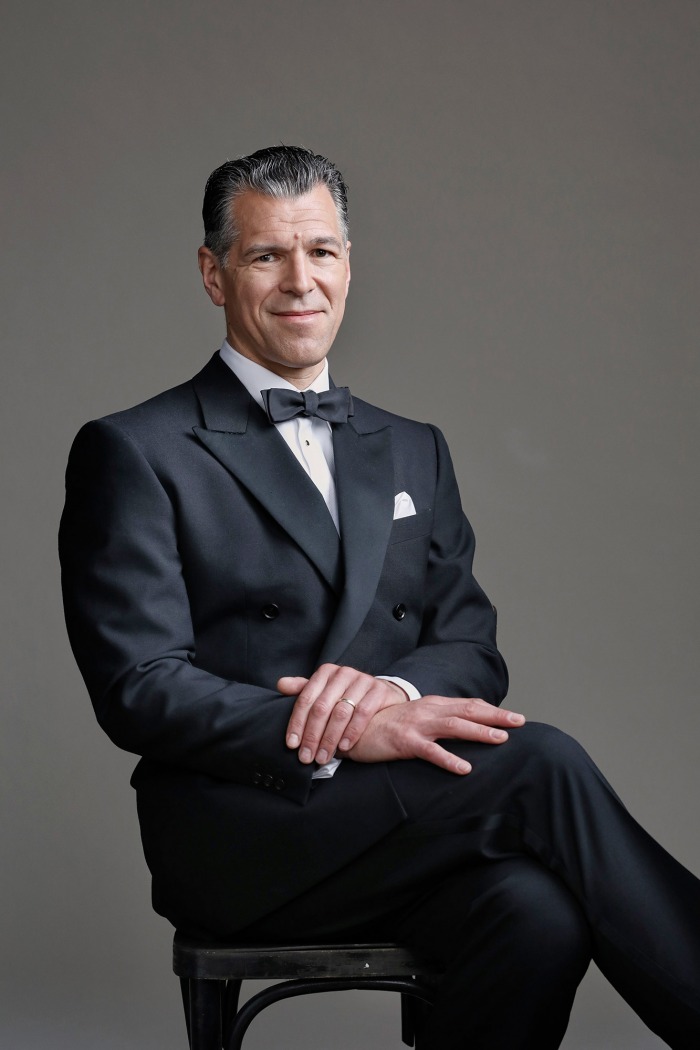Escapism sometimes feels not just useful but necessary. To be carried back, for an evening, to the world of the 1920s/1930s dance band, with foxtrots, pasodobles, crisp starched collars and secco endings, of slick hair and even slicker arrangements, does have a lot to recommend it. And a virtually packed house in Cadogan Hall last night were palpably more than happy to be taken there.
We were in assured hands. Although this is the very first UK tour by the 12-piece, Berlin-based Palast Orchester, the band led by Max Raabe has existed since the singer started it in1986, and it has kept hold the majority of its personnel ever since. It has a repertoire of well over 600 arrangements. This is a working band in every sense of the phrase, which performs throughout the year for both concerts and functions, mostly in the German-speaking world but also beyond it.
 It is a fine band with musicians capable of extraordinary feats of doubling on different instruments. The double bassist Bernd Hugo Dieterich is equally at home switching to sousaphone. Trombonist Jörn Ranke switches to viola alongside the guitarist’s violin to form a three-part string section with regular violinist Cecilia Crisafulli. The English-born pianist Ian Wekwerth (pictured left courtesy of the Palast-Orchester) – he originally went to Berlin to study aeronautical engineering – switches to accordion for the tangos. There are players who can step forward and do vocal harmonising, evoking memories of the Comedian Harmonists. And if there was one point when the Palast-Orchester became a dectet of synchronised handbell ringers playing a waltz over a strutting bass from the sousaphone…well, you just had to be there.
It is a fine band with musicians capable of extraordinary feats of doubling on different instruments. The double bassist Bernd Hugo Dieterich is equally at home switching to sousaphone. Trombonist Jörn Ranke switches to viola alongside the guitarist’s violin to form a three-part string section with regular violinist Cecilia Crisafulli. The English-born pianist Ian Wekwerth (pictured left courtesy of the Palast-Orchester) – he originally went to Berlin to study aeronautical engineering – switches to accordion for the tangos. There are players who can step forward and do vocal harmonising, evoking memories of the Comedian Harmonists. And if there was one point when the Palast-Orchester became a dectet of synchronised handbell ringers playing a waltz over a strutting bass from the sousaphone…well, you just had to be there.
If their set-lists in Germany have been known to stray into pop covers, here they stayed resolutely in the dance band era. The Palast-Orchester’s arrangements are always extremely cunning and never less than very stylish. One unsung hero of this show is the prolific and adept arranger Günther Gürsch (1919-2009) whose fine work constituted about a third of last night’s programme. An unnamed arranger has also done a very clever version of Brecht/Weill’s Mackie Messer (Mack the Knife) for the orchestra, with some sly modulations and reharmonisations, effortlessly switching into and out of a contrasting quote/countermelody from the “Lied von der Unzulänglichkeit”, also from the Threepenny Opera.
The repertoire for this four-date UK tour has been deliberately slanted towards more repertoire sung in English than the band normally plays in the German-speaking world. Most Germans know the happy tune “Wochenend’ und Sonnenschein” from either the Comedian Harmonists or from Max Raabe. And last night we duly had Günther Gürsch’s fleet and crisp arrangement of it, which the Palast Orchester has as a staple in its repertoire. But it was sung not in German but to its original English words: “Happy Days Are Here Again.”
The resonances of the song in the two languages are very different. In German, the words of “Wochenend’ und Sonnenschein” assert a decree, allegedly from God, that working people should rest at the weekend, head off to the woods and just be contented. In America the song was the theme which accompanied the Roosevelt presidential campaign in the 1930s and became, for a time, the anthem of the Democratic Party.
If the listener’s mind goes off in such directions, it is perhaps a reminder of how much Raabe quite deliberately leaves unsaid. Ironies are not so much there in this show as absolutely everywhere. The dance band era in Germany was the period of the Weimar Rebublic and coincided with the rise of nationalism. Raabe’s song introductions on this tour are given in deadpan, perfectly enunciated English, (although he always puts the German “ü” sound into the word “lyrics”). While other performers might choose to show sincerity and emotion and to show the need to forge a connection with the audience, Raabe’s way is to stay silent. He addresses the ever-present irony by letting his eyebrows and his pointed stare into the audience do the talking. It is part of the show, He stays in character, even when making a carefully-phrased allusion to Donald Trump as an aside in a story about Samson, Delilah and strange haircuts.
There is that curious Noel Coward quote: “It is strange how potent cheap music is.” This was a concert that had a curious and almost indecribable poignancy - and was all the better for it.















Add comment